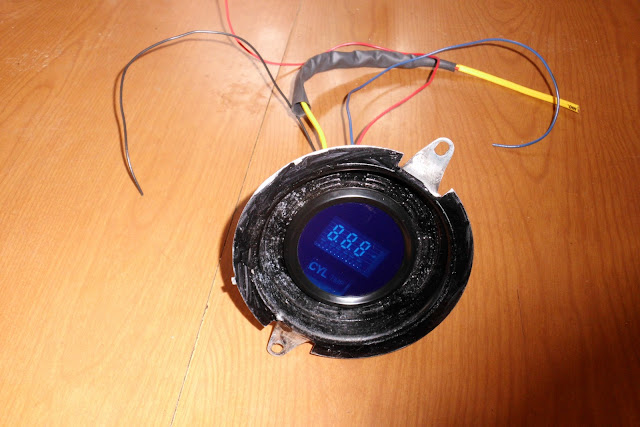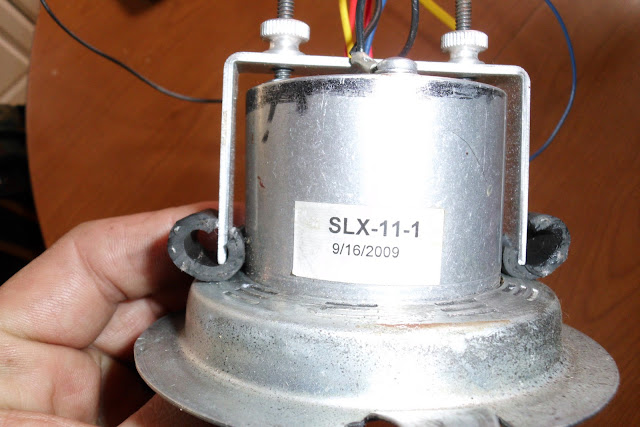Page 1 of 1
Dakota Digital CHT gauge
Posted: Sun Apr 03, 2011 10:09 am
by tristessa
Giving y'all first crack at this before I put an ad on
Theother
Site...
Dakota Digital Cylinder Head Temperature Gauge, with customized plate to install in the "3rd gauge" hole of the instrument panel. Sender not included, but the 18-foot length for Busses is available
here from Dakota Digital.
Not looking to make a fortune, $60 shipped in US, $55 if you pick up. This gauge is over $100 new from DD and doesn't include the sender anyway. Paypal, money order and cash accepted.



Re: Dakota Digital CHT gauge
Posted: Sun Apr 03, 2011 7:08 pm
by hambone
That's a good price. I'd consider but I prefer analog. CHTs are pretty expensive, I was pricing them yesterday. I'll have to keep relying on common sense....................
Re: Dakota Digital CHT gauge
Posted: Wed Apr 06, 2011 3:03 am
by Morgoon
Pm sent :)
Re: Dakota Digital CHT gauge
Posted: Mon Apr 11, 2011 12:15 pm
by airkooledchris
somewhat off topic, but when you were running this, what sort of numbers were you seeing? (assuming it was installed under the #3 plug, so you can compare it to others with the same install location)
Re: Dakota Digital CHT gauge
Posted: Mon Apr 11, 2011 3:50 pm
by Amskeptic
airkooledchris wrote:somewhat off topic, but when you were running this, what sort of numbers were you seeing? (assuming it was installed under the #3 plug, so you can compare it to others with the same install location)
Currently, I am running 425-430*F at 75 mph I-75 northbound near Tampa at 88* ambient, max reading 440* passing a truck at 78 mph.
Nuts. I am hooking up your LM-1 in 15 minutes so I can start playing with the mixture to tame these heart-attack readings. With gas at $4.00/gallon, I was set pretty lean.
ColinTampa-to-Jacksonville
Re: Dakota Digital CHT gauge
Posted: Mon Apr 11, 2011 5:08 pm
by airkooledchris
Amskeptic wrote:airkooledchris wrote:somewhat off topic, but when you were running this, what sort of numbers were you seeing? (assuming it was installed under the #3 plug, so you can compare it to others with the same install location)
Currently, I am running 425-430*F at 75 mph I-75 northbound near Tampa at 88* ambient, max reading 440* passing a truck at 78 mph.
Nuts. I am hooking up your LM-1 in 15 minutes so I can start playing with the mixture to tame these heart-attack readings. With gas at $4.00/gallon, I was set pretty lean.
ColinTampa-to-Jacksonville
thank you for sharing this Colin, this is exactly what I was hoping to hear. (not that your running hot, just what the baseline would be on a stock setup) it'll be interesting to know if you find that your CHT's go up and/or down based on mixture and if so, how much.
are you running your sensor also under the #3 plug? or did you go to #2? (just wondering if were comparing oranges to oranges.)
im running hotter than you are currently, but with 60* ambient temps. if I just drive it where it feels good I can pretty easily start pushing over 450*F...... I drove it a month ago about 7 hours each way and I cringe to think what my head temps were during that trek (though I still question weather it's abnormal for them to be as high as were seeing, or that the results are accurate)
Re: Dakota Digital CHT gauge
Posted: Tue May 10, 2011 10:28 pm
by Lanval
I gave this a good deal of thought with my 82 air-cooled, which I really cooked for fun one day in August on the way to Vegas.
There are two things going on here, and Colin and I have discussed it.
1. These engines can take much more heat and abuse than you think. They were using these types of engines in the desert campaigns of WWII, and I somehow doubt they were checking the cylinder head temps religiously. Yes, some engines no doubt failed, but the air-cooled engine can take a real beating heatwise, and keep going.
2. On the other hand, at the time that A/C engines were invented and used broadly in Germany, the kinds of high-speed driving (in excess of 100 Kph) wasn't realistic, or for the most part even possible. These engines are meant to run much closer to 55 mph; high speed was never their game.
This is why I suspect that people burn these engines up. A few minutes uphill in high temps isn't a killer; hours on the freeway will be (I use "killer" loosely here ~ I really mean shortening the life of the engine).
I will add that everything I know about owning a car in the 30s and 40s (which came from my grandfather, who was a mechanical engineer) is that most people had their hands in/on the engine often, adjusting, checking and so on. This must have led to more attentive treatment of the engine than the modern "drive w/o knowing what's under the hood" mentality, and as Colin has so often mentioned, the wonderful VW boxer really shines if you just give it a bit of constant attention.
That's my take anyway.
Lanval
Re: Dakota Digital CHT gauge
Posted: Thu May 19, 2011 6:32 am
by Bleyseng
nah, VW set up the engines so at freeway cruizing you are at 3500-4000 rpms which is MAX cooling of the fan. The problem of the type 4 heads is valve seat material which doesn't have the best expansion rate in a aluminum head. Get too hot too many times and pull the bus over without running it to cool it and the valve seat falls out.
The new heads with the new valve seats don't do this so you can drive safely at Freeway speeds and at 400F CHT's. Still constant 450F CHT is scary as at aluminum heads can suffer from that prolonged heat.
Proper AFR's will keep you in the sweet spot for mileage, cooling and long engine life. I like to set it for 14 to 14.3 to one at 2500 rpms under a slight load going 30 mph.
Re: Dakota Digital CHT gauge
Posted: Fri May 27, 2011 6:45 am
by steve74baywin
Lanval wrote:
2. On the other hand, at the time that A/C engines were invented and used broadly in Germany, the kinds of high-speed driving (in excess of 100 Kph) wasn't realistic, or for the most part even possible. These engines are meant to run much closer to 55 mph; high speed was never their game.
This is why I suspect that people burn these engines up. A few minutes uphill in high temps isn't a killer; hours on the freeway will be (I use "killer" loosely here ~ I really mean shortening the life of the engine).
Lanval
Over the years I have changed my driving habits.
I used to drive twelve or my hours on the freeway at 70mph. Now I prefer to drive about 8 hours and find roads where 60 mph is more likely.
Driving 75 to 80 all day is like taking a car that can max 130 and driving 115 all day, it just is going to wear more so.


